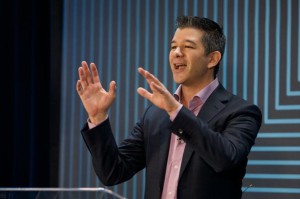
Uber CEO Travis Kalanick is facing an mounting list of problems that are beginning to concern investors.
Already under fire over allegations of sexual harassment facing its female employees, things continue to get worse for American car-sharing giant Uber.
The company’s recently hired engineering chief has been forced out by Uber CEO Travis Kalanick. According to reports, Amit Singhal was asked to leave after Uber learned he had faced a “credible” charge of harassment during his previous post as an executive at Google.
“Harassment is unacceptable in any setting. I certainly want everyone to know that I do not condone and have not committed such behavior,” Singhal said in a statement. “In my 20-year career, I’ve never been accused of anything like this before and the decision to leave Google was my own.”
Uber has been bouncing from one crisis to another in recent months, and is now facing a revolt by users backed by the #DeleteUber campaign.
In December, the ride-sharing service launched an autonomous vehicle test program in San Francisco but refused to apply for the necessary state permit. It subsequently pulled out of the pilot project when the California Department of Motor Vehicles threatened to have the effort shut down, Uber moving the self-driving Volvo XC90s to Arizona.
Then, in January, it came under fire by those who opposed CEO Kalanick’s decision to join President Donald Trump’s economic advisory council. That flare-up intensified when Uber was accused of taking steps to profit from a New York City cab boycott called in response to Trump’s immigration ban.
Uber subsequently issued a statement opposing the so-called “Muslim Ban,” and Kalanick quit the advisory board, but not before thousands of customers reportedly quit the service.
(Uber hires former U.S. Attorney General to investigate harassment claims. Click Here for the story.)
The company found itself back in the news when former engineer Susan Fowler Rigetti posted a blog entry describing “an organization in complete, unrelenting chaos.” She said she quit Uber after a year of ongoing harassment, including propositions from her original boss. She also insisted that efforts to address her concerns with Uber’s human resources department were rebuffed. Rigetti noted that the share of women in the company’s engineering department fell from 25% to 6% during her tenure.
Uber responded by ordering an investigation into the charges. Among those assigned to the effort, it said, would be Arianna Huffington, an Uber board member, as well as former U.S. Attorney General Eric Holder.
But despite the move, investors, analysts and customers have remained skeptical. The #DeleteUber campaign has geared up again. And, in another embarrassing move, it was revealed that the company sent e-mail responses to some customers quitting the service telling them it was “hurting.”
Various reports, including those by NBCNews, USA Today and others, have described a “baller culture” at Uber that was notably unfriendly to women. Macho behaviors, such as chest bumps to mark successes, as well as push-up contests, were supposedly commonplace.
(Sex harassment claim raises more problems for Uber. Click Here to get details.)
Meanwhile, reports have also surfaced that Uber had considered taking steps to investigate journalists it didn’t consider friendly to the service.
Uber has not responded to the latest news, though ousted engineering chief Singhal has denied the charges against him.
The headlines – as well as the threatened boycott – compound the economic challenges facing Uber. Though it has been a darling of investors, the company recently revealed an $800 million loss for the third quarter of 2016. It is widely expected to remain in the red for the final three months of the year when those numbers are reported.
“Now the company’s horrific culture has been exposed in terms that may cause an acceleration in the #DeleteUber campaign,” warned Roger McNamee, founding partner at venture capital firm Elevation Partners.
(To see more about Waymo sues Uber for intellectual property theft, Click Here.)
How it handles the investigation could be critical, Uber investors Mitch and Freada Kapor declared in an open letter to CEO Kalanick. “Uber’s response to this particular crisis will be defining for the company, so the stakes are high to get it right.”

